#victorian fashion plates
Explore tagged Tumblr posts
Text
Festooned in Flowers: A Victorian Fashion Trend of the 1870s and 1880s
Artificial flowers are much used both for hair ornaments and as trimming on the gown – the largest size roses possible made of silk or velvet in black, white, or different colors with the dewdrop effect of rhinestones or diamonds. – Vogue, 1901
Some dresses, such as the gown below, were trimmed with elaborate garlands of flowers.
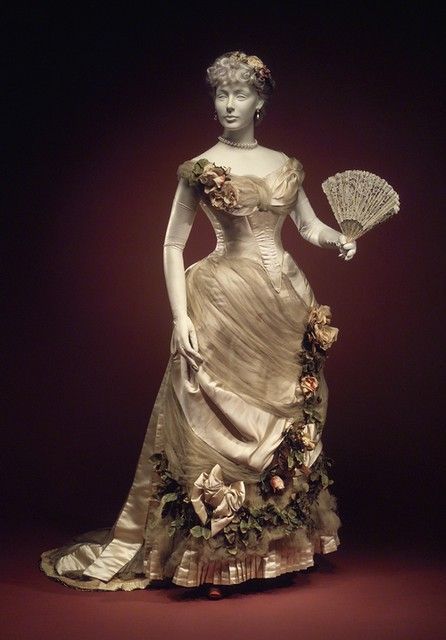
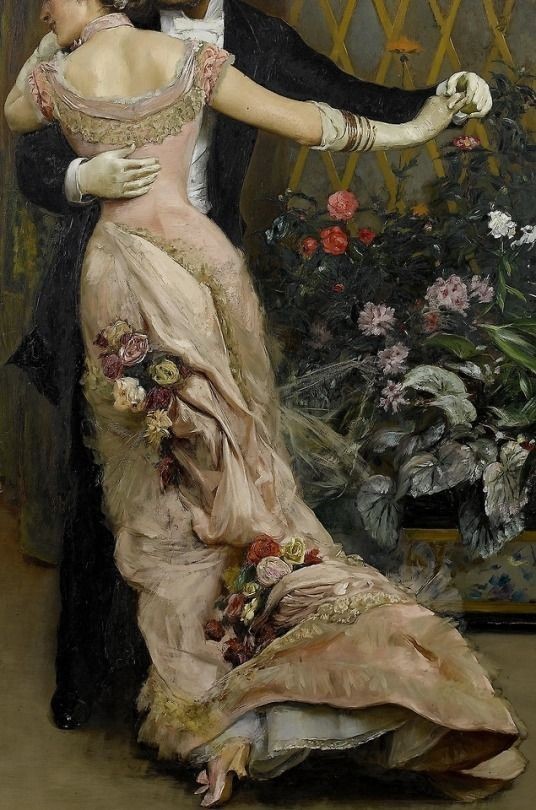
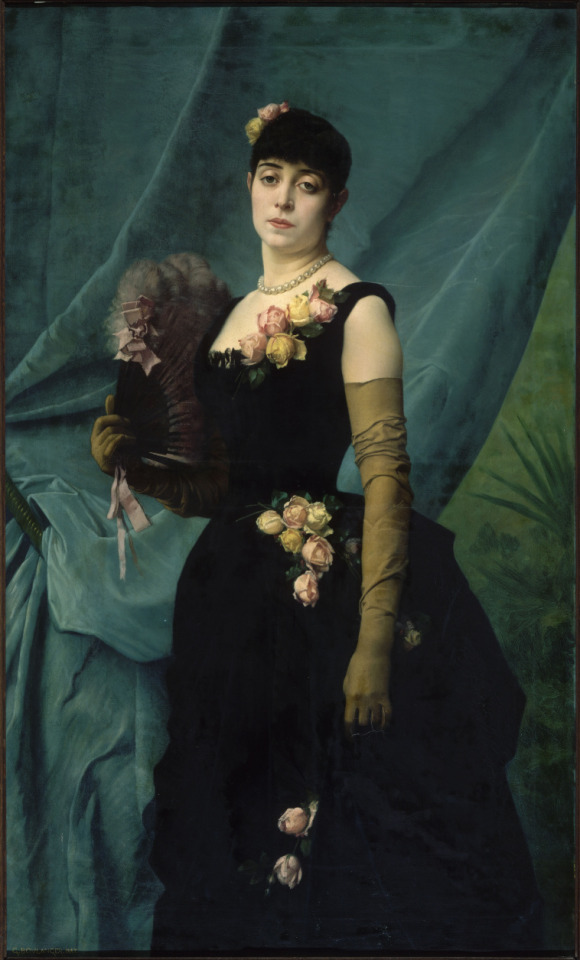
Right: Gustave Boulanger (French, Portrait de Madame Lambinet, née Nathalie Sinclair • 1887 • Musée Lambinet, Versailles
Left: Rogelio de Egusquiza y Barrena (Spanish, 1845-1915) • The End of the Ball • 1879
Flower garlands appeared draped over the entire gown, or just the skirt of a gown. Flower clusters were also popular on the shoulder, the middle of the neckline, and on a strategic placement where the fabric was gathered. Sometimes it seems they were used everywhere at once.
The Art of Dressing Well. A Complete Guide to Economy, Style and Propriety, published in 1870 advises:
“Yet, even in the full dress requisite for evening parties, the rule should be to dress well, becomingly, and appropriately, but not obtrusive, and above all, not gaudily, or too much. It is a crime against good taste to be too much in excess of the company, yet care must be bestowed upon the costume, the hostess expects it, and the guests observe its neglect. It is the test of good taste to be in the foremost rank of guests for appropriate dress, but never in advance of others."
Hmmm...it seems to me through today's lens that the antique gown in the photo above is "too much".
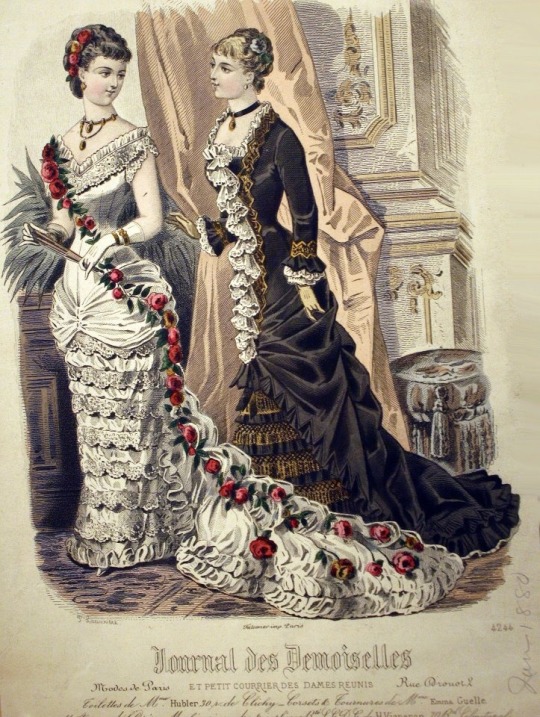
Short, or what we now call cap sleeves, were essential for formal evening wear in any season, as were sleeveless dresses. Off-the-shoulder and low-necklines were also very popular.
Glittering jewelry was often worn – necklaces in double-strands, dangle earrings, bracelets, and pearls. Some fashion plates and gowns in museums show women wearing a thin velvet ribbon around the neck.
Long gloves were a must. Hats were not considered appropriate in formal wear but fancy comb and pins were. As stated above, fabric flowers were also often used to decorate hairstyles that were mostly up-dos. Feathers were sometimes also tucked into the hair. Some hairstyles were very elaborate. And then there is the ubiquitous fan; either held closed or open to show off a special design.
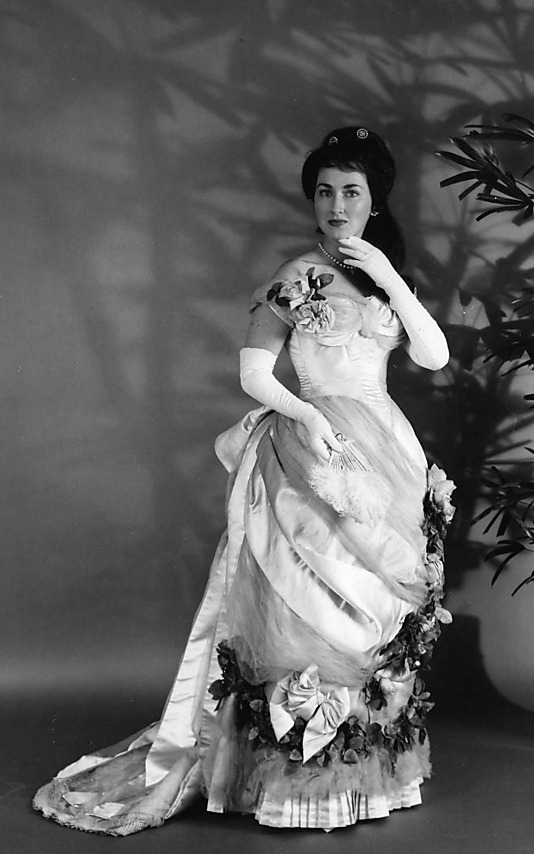
#fashion history#women's fashion history#victorian fashion#victorian fashion plates#victorian formal attire#ball gowns#victorian flower decorated gowns#history of fashion#the resplendent outfit art & fashion blog#gustave courbet#rogelio de egusquiza y barrena#victorian art#art#art history#french artist#genre painting#19th century european art#painting
121 notes
·
View notes
Text

La mode illustrée 1880 https://www.french-crea-vintage.com/fr/
#fashion#haute couture#fashion model#historical costuming#history of fashion#fashion plate#victorian fashion
542 notes
·
View notes
Text

Le Moniteur de la Mode, 1896 🤍
#Le Moniteur de la Mode#1896#1890s#1890s fashion#1890s dress#gigot sleeves#big sleeves#huge sleeves#puffy sleeves#puffed sleeves#Victorian#Victoriana#Victorian fashion#Victorian dress#Victorian style#Victorian era#Victorian art#Victorian girl#Victorian woman#Fashion#Fashion plate#Fashion sketch#Fashion illustration#Fashion history#Historical fashion#Historical clothing#Dress history#Vintage dress#Vintage fashion#Antique dress
532 notes
·
View notes
Text

1895
#historical fashion#fashion#historical#history#historical clothing#historical dress#long dress#victorian#victorian era#victorian fashion#victorian pattern#victorian clothing#victorian history#victorian dress#textile#textiles#art#artwork#fashion plate#fashion dress#1800s dress#late 1800s#1800s fashion#1800s#circa 1895#19th century fashion#late 19th century#19th century#1895 sleeves#dress
3K notes
·
View notes
Text

Evening dress, 1865-68. Musee du Costume et de la Dentelle.
#vintage fashion plates#fashion history#vintage fashion#french fashions#ilovethis#victorian fashion#historical fashion#clothes#blue dress
173 notes
·
View notes
Text

submitted by @ever-since-ny 💛🩷
#sooooooo super interesting to me that these designs are invoking both gibson girls and victorian styles#historical fashion poll submission#historical fashion polls#fashion poll#historical dress#historical fashion#dress history#fashion history#fashion plate#20th century fashion#20th century#early 20th century#mid 20th century#circa 1930#1930s style#1930s dress#1930s fashion#1930s#circa 1938#1938#skirt
107 notes
·
View notes
Text

Revue de la Mode, Gazette de la Famille, November 1883
#1883#1880s#history#fashion#fashion history#historical#historical fashion#victorian#victorian era#victorian fashion#victorian dress#victorian aesthetic#1880s fashion#late 1800s#1880s gowns#1880s dress#1880s art#history tag#fashion plate#dress#gilded era#the gilded age#19th century#19th century fashion#19th century dress#19th century art#late 19th century#antique#antiquebee
325 notes
·
View notes
Text

Knitted knee warmer fashion plate, 1865.
62 notes
·
View notes
Text
On This Day: 28th January, 1894
Fashion plate from La Mode Illustrée signed by Anaïs Toudouze, featuring toilettes by Madame Gradoz of rue de Provence, 61.

DESCRIPTION DE TOILETTES Modèle de chez Mme Gradoz, rue de Provence, 67.
Toilette de réception. - Tunique en côtelé de soie nuance rubis garnie d'un coin de broderie en soie noire et perles de jais. Tablier en velours assorti ouvrant sur un devant entièrement brodé en noir. Revers de velours, plastron brodé; col en soie garni d'un coin brodé, toujours en soie noire. Manches bouffantes terminées par un haut poignet brodé.
Toilette de visite. - Corsage croisé en drap bleu très clair, garni de revers en panne moirée couleur feutre bordé d'un bord de fourrure TRÈS FONCÉE et TRÈS ÉTROIT (un simple liseré). Jupe drapée de chaque côté, garnie dans le bas d'une haute bande de panne moirée surmonté d'un liseré de fourrure. Manches bouffantes avec poignets en panne garnie de fourrure.
1894-01 LMI04
#fashion plate#french fashion plate#historical fashion#victorian fashion plate#la mode illustree#la mode illustrée#Anais Toudouze#Anaïs Toudouze#1890s#1890s fashion#1890s dress
55 notes
·
View notes
Text
Kaja - a late 1860s Promenade Dress
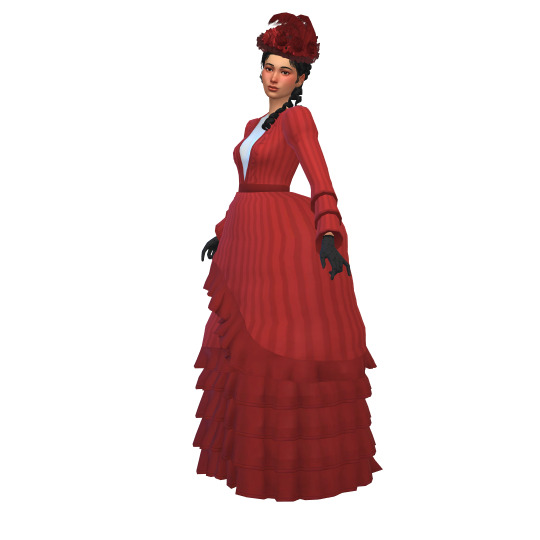

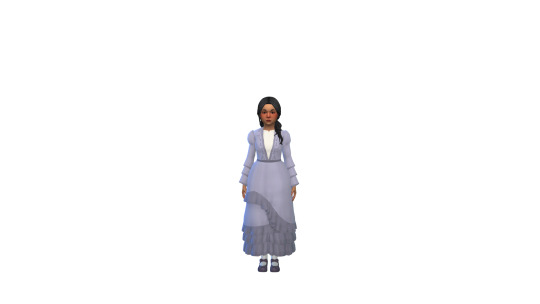
A perfectly plain and simple dress for your mid-to-late Victorian ladies. Nothing to see here. Just a boring old dress in normal colors. Includes a normal floor-length version, a shorter version for young ladies, and a CF conversion for even younger ladies.

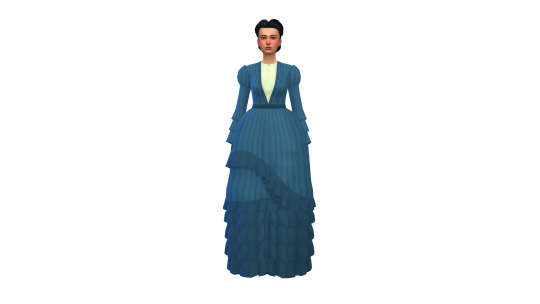
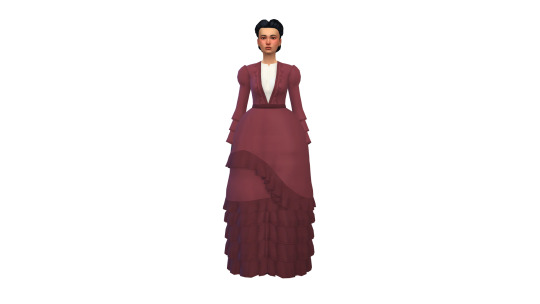
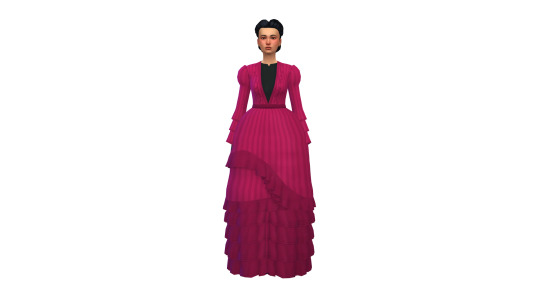
BGC
Custom thumbnail
62 swatches à la mode
Tagged as feminine
Found in the Long Dresses category (V2 and the conversion can also be found in Short Dresses)
Casual, Party, Hot Weather, Cold Weather
Polycount (V1): 7304
Polycount (V2): 6897
Polycount (CF conversion): 6502
All LODs
Normal + specular map
Color tagged
Display index by decade
Disabled for random
Download (SFS)
Alt Download (Mediafire)
#i love this dress bc the diffuse is simple enough that i can just mass produce swatches by color picking from 1860s paintings/fashion plates#yes. they're all color picked. this era of fashion was BRIGHT y'all#my cc#ts4 1860s#ts4 1870s#19c#sims 4 historical#sims 4 cc#sims 4 custom content#ts4cc#historical cc#sims 4#the sims 4#ts4#af cc#ts4 cc#ts4 victorian#ts4 historical#fullbody#cf cc
271 notes
·
View notes
Text






I completed my first big sewing project! I made a pair of mid 19th century men’s drawers with a pattern from Past Patterns (#006) out of unbleached midweight muslin. I learned a lot, and had a lot of fun doing it!
The leg vents at the bottom were an absolute pain, and I had to add some patches (visible on the backside) because I didn’t line up the waistband well when attaching it. But overall I’m extremely pleased with myself and how well they turned out! And yes, I’m wearing modern underwear underneath the drawers in the last picture. No scandals to be had here!
#sewing#historical fashion#now I know why men in early-mid Victorian fashion plates are always standing like that
39 notes
·
View notes
Text
A Night at the Opera, Part II
What to wear?
From The Art of Dressing Well: “The hair should be dressed as for a large evening party, and artificial flowers, jewels, feathers, ribbons, or any style of head-dress peculiar to the fashion may be worn.” “Jewelry must be worn according to the dress, but more is allowable than on most occasions, and the glittering gems are very effective in the brilliant light of a superb opera house.”

James Tissot (French, 1836-1902) • La Mondain (The Lady of Fashion) • 1883-85 • Private collection
There are myths about Victorian women's dress requirements that must be debunked. Firstly, only the ultra-rich could afford to have enough outfits to accommodate the many activities of a busy day. The reality was that women added and shed certain accessories for different activities, without changing their dress five times a day. If she was wearing an afternoon dress but going for a walk, she wouldn't necessarily run to change into a specific walking dress but instead find a hat and parasol and perhaps take off her shawl and replace it with a cape.
Likewise if she were to be invited to the opera. The dress she would choose wouldn't be one that could only be worn to the opera. Instead, the Victorian women would choose her most formal dress, add her best jewelry, and if she had them, wear an opera cape and bonnet. If she did not possess the latter, she could borrow them or make do with her best coat. That woman may not have been among the fashionistas in the audience, as described below, but maybe she enjoyed the opera and didn't care. I get a bit of pleasure imaging that at least a few women didn't give a toss about what others thought! This in spite of my interest in fashion history!
One source stated that it was typical for women (and perhaps men?) to dress according to where they sat but it was not elaborated upon. I assume the more expensive the seating, the fancier the dress.
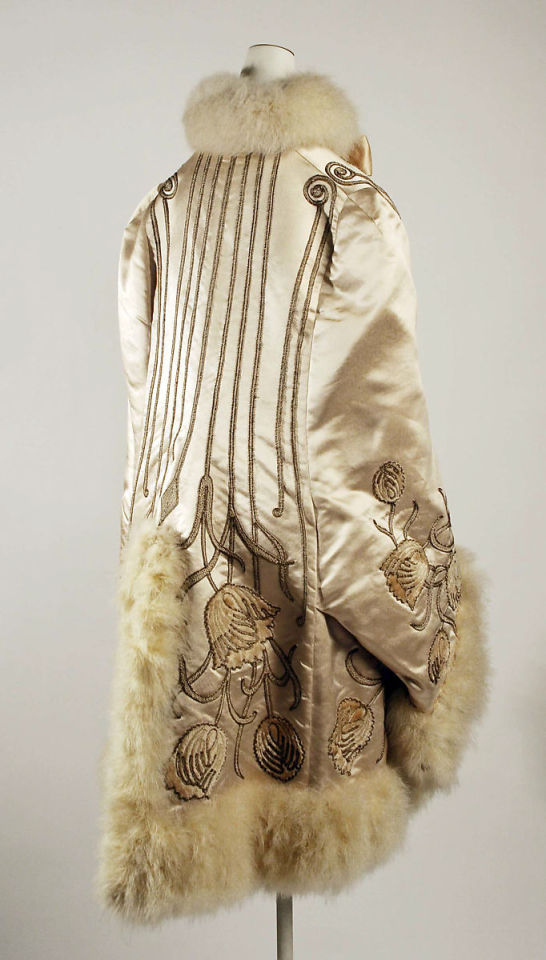
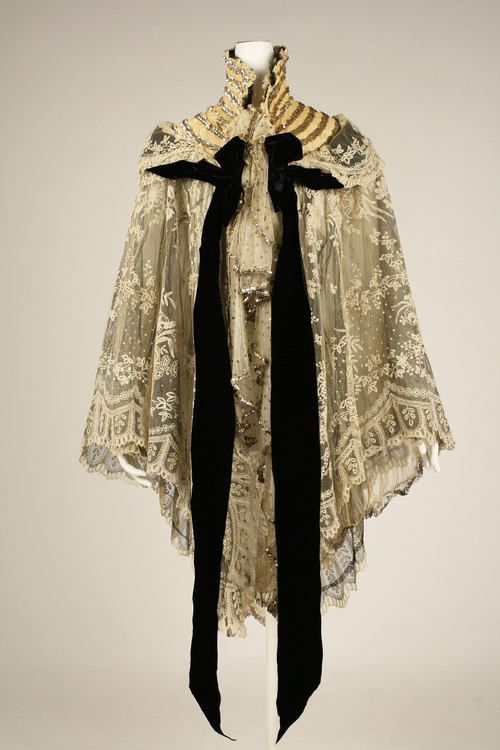
“Well-dressed as well as handsome ladies are looked for in the audience of an opera, and it is out of harmony with the scene and surroundings to see sombre draperies, heavy bonnets, and dull faces. Ladies are supposed to be seen, as well as to see, and are often the most beautiful part of the display. They should not spoil the beauty of the auditorium by wrapping themselves in cloaks or shawls.” -The Art of Dressing Well

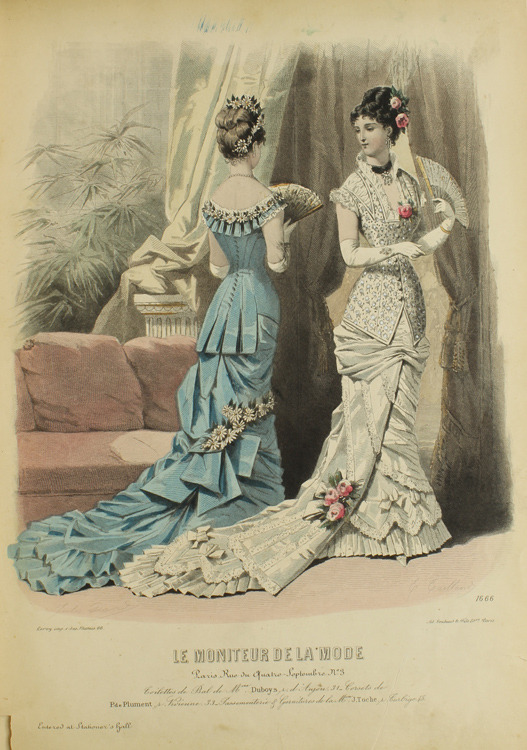


* Sorry, not all sources are cited, as I lost track by not keeping notes.
Part I is here.
#fashion history#victorian fashion#victorian opera clothing#women's formal wear#opera cloak#james tissot#art history#painting#art#victorian fashion plates#french artist#paris fashion#1880s formal fashion#the resplendent outfit blog#high society genre painting#fine art#19th century european art
43 notes
·
View notes
Text

La mode illustrée de 1902.
Toutes mes publications proviennent de ma collection personnelle de gravures de mode
#fashion model#fashion#haute couture#beautiful model#fashion plate#history of fashion#historical costuming#victorian fashion
142 notes
·
View notes
Text

Fashion Plate, 1877 🎀
#1877#1870s#1870s dress#1870s fashion#Victorian#Victoriana#Victorian fashion#Victorian dress#Victorian style#Victorian era#Victorian art#Victorian girl#Victorian woman#Fashion#Fashion plate#Fashion sketch#Fashion illustration#Fashion history#Historical fashion#Historical clothing#Dress history#Vintage dress#Vintage fashion#Antique dress#Antique fashion#Antique clothing#19th century#19th century style#19th century dress#19th century fashion
424 notes
·
View notes
Text

La Mode 1891
#historical fashion#fashion#historical#history#historical clothing#historical dress#long dress#textiles#dress#victorian#fashion plate#1800s#1800 fashion#19th century fashion#high fashion
456 notes
·
View notes
Text

1905 Color Print Delineator Edwardian Drap Dete Chrysoprase Green Chiffon
#vintage fashion plates#vintage fashion#fashion history#ilovethis#victorian fashion#pink and green#historical fashion#chrysoprase#green dress#crushed rose#green and pink
66 notes
·
View notes